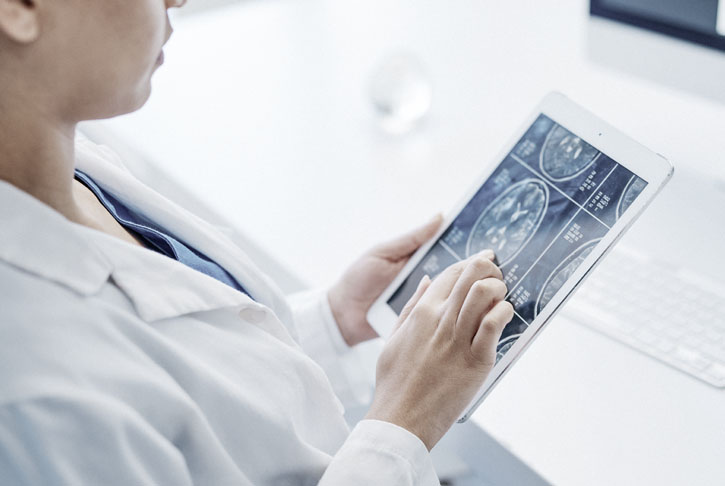Rudolfinerhaus Privatklinik GmbH
Billrothstraße 78
1190 Vienna

Cognitive disorders may have many causes.
Of the various forms of dementia, Alzheimer’s disease takes the position of foremost importance. However, not every form of memory disorder (the inability to retain and recall information) is a grave disease such as dementia – it may occur due to other causes. For timely and appropriate treatment of all cognitive disorders, early detection is of crucial importance.
The Memory Centre at Rudolfinerhaus Private Clinic in Vienna is your first point of contact for concerns relating to possible memory deficits, memory disorders, and dementia. Udo Zifko, MD, head of the Memory Centre, is a specialist in neurology and psychiatry, as well as an internationally renowned specialist for dementia and its diagnosis. A team of neurologists and clinical psychologists will attend to your concerns.
Comprehensive Diagnostics on Site and Treatment of Alzheimer’s Disease
Furthermore, the Memory Centre at Rudolfinerhaus is one of the few centres that is approved for the administration of a novel therapy for Alzheimer’s disease. The infrastructure at Rudolfinerhaus offers you investigations, diagnostic procedures, and additional personal services directly at the hospital:
- Consultation with specialists
- Laboratory tests and genetic tests
- Neuropsychological diagnostic procedures
- Diagnostic imaging (high-resolution MRI, CT)
- Lumbar puncture and cerebrospinal fluid analysis
- Physical therapy
- Counselling for relatives
- Nutrition counselling
Treatment is most effective in the early phase
If you notice mild cognitive impairments in yourself or your relatives, such as a decline in memory, concentration problems or initial word-finding difficulties, discuss this and make an appointment at the Memory Centre as soon as possible. The earlier a possible disease is diagnosed, the more effective the treatment will be. With the Memory Check we can rapidly establish whether an actual pathological (disease-related) change has occurred and a therapy plan tailored to your needs can be created.
Memory Check
(takes about 4 hours, on an outpatient basis)
Clarification in case of the first signs or sensation of memory disorders, or worries about possible memory deficits.
- Initial consultation with a specialist in neurology, specialist for dementia, including medical history
- Blood analysis including risk profile documentation, complete blood count, inflammation parameters (CRP), electrolytes (Na, Ca, K, Cl), blood sugar, liver values (GOT, GPT, gamma-GT, bilirubin, alkaline phosphatase), cholesterol (total, HDL, LDL), kidney values (creatinine, blood urea nitrogen), thyroid (TSH), vitamin B12
- Neuropsychological diagnostic investigation (takes about 1 to 1.5 hours)
- Final consultation with the doctor and discussion of reports after about 2–3 weeks
Innovative therapy for early-stage Alzheimer’s disease
The new active substances lecanemab (Leqembi™) and donanemab (Kisunla™), approved in the EU in 2025, are the first effective treatment for Alzheimer’s disease throughout the world. Both substances are monoclonal antibodies that act on the protein amyloid-beta. Amyloid-beta is responsible for the plaques in the brain causing Alzheimer’s disease, which lead to the death of nerve cells in the brain. The active substance identifies and binds this protein. This triggers an immunological response in the brain. The plaques are transported out of the body and the emergence of new plaques is prevented. The treatment cannot cure Alzheimer’s disease, but can slow down the progression of the disease as well as the deterioration of cognitive function. The probability of the disease passing on to the next higher stage of severity is reduced by about a third compared to the absence of this treatment.
Who is permitted to receive this treatment?
The medications are only suitable for those with Alzheimer’s disease in the early stage, in whom the disease has been diagnosed with absolute certainty. This refers to persons who have a largely normal daily life, are still partly professionally active, but notice difficulties in short-term memory. Therefore, early detection is essential for the treatment. Risk factors must be ruled out prior to the start of therapy in order to avoid potential side effects of the medication. Contraindications include a specific gene variant, microbleeding, coagulation disorders, or anticoagulant drugs. Follow-up investigations are performed regularly during the treatment.
Access to treatment with lecanemab & donanemab
Treatment for those with existing diagnostic approval
For those who have all diagnostic reports that favour treatment with one of the two substances – lecanemab or donanemab – the treatment can be started immediately.
- Treatment and approval of the existing reports by a specialist in neurology, a specialist for dementia
- Outpatient infusion therapy (duration 2–4 hours):
Lecanemab: 2 x per month for 18 months (in all 36 infusions)
Donanemab: 1 x per month for 18 months (in all 18 infusions)
The first infusion is administered during an in-patient hospital stay for a night. - Follow-up diagnostic investigations (as outpatients, under ongoing treatment) consisting of regular MRI control investigations and neuropsychological tests
Price on request
If treatment is desired in the absence of diagnostic approval
If Alzheimer’s disease has been diagnosed at an early stage but a patient’s suitability for treatment with one of the two active substances has not yet been clarified, the investigations required for this purpose can be performed.
- First consultation with a specialist in neurology, specialist for dementia
- In-hospital stay (1–2 nights) for comprehensive neurological, neuropsychological and internal diagnostic investigations
Price on request
The Memory Centre at Rudolfinerhaus is one of the few centres in the whole of Europe that is permitted to administer this treatment by infusion. Currently, Austrian patients may only be treated at the University clinics (as of October 2025); diagnostic investigations and follow-up controls may be performed at Rudolfinerhaus. Non-Austrian citizens may avail themselves of the infusion therapy at the Memory Centre with immediate effect – either with a private health insurance or as self-payers.
